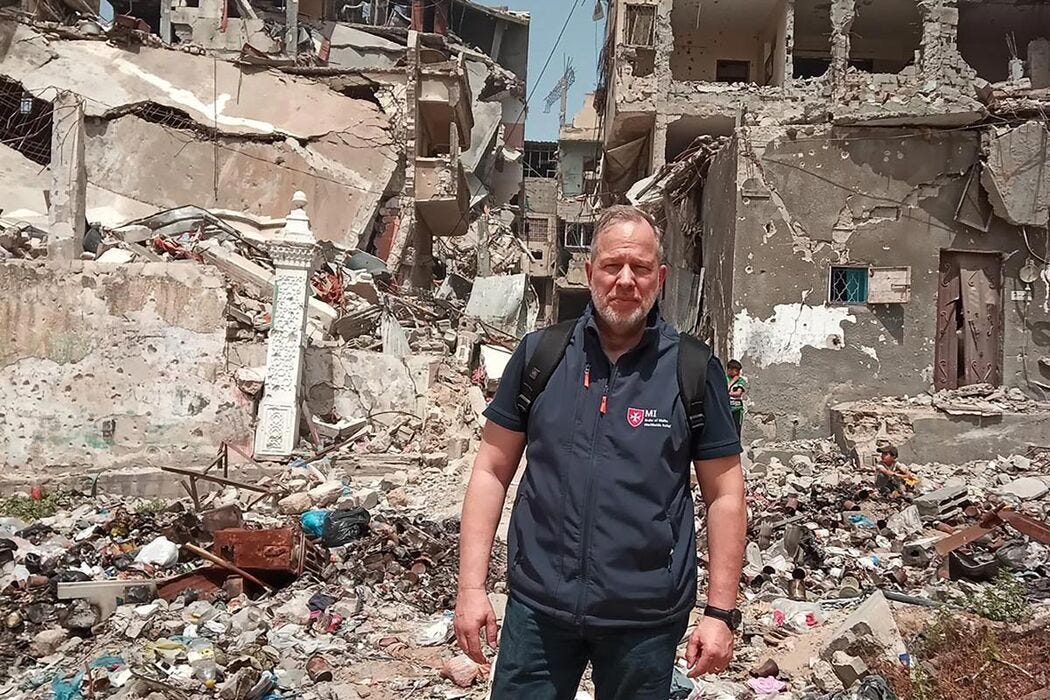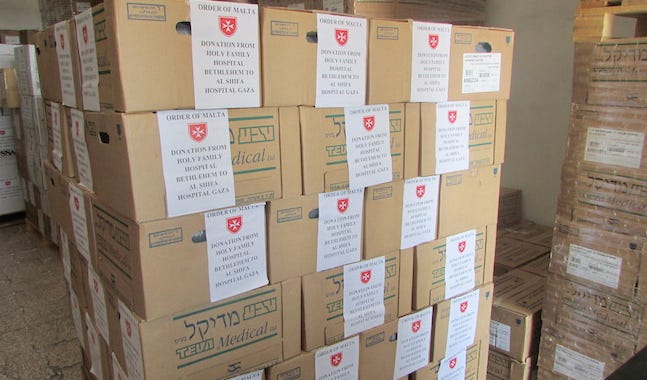
An actual field hospital: The Order of Malta’s ambitious Gaza mission
The head of Malteser International's Middle East division told The Pillar about 'operationalizing' their Catholic identity
The Sovereign Military Order of Malta is one of the most unique and historic institutions in the Catholic Church.

At once a religious order under the jurisdiction of the pope and a sovereign authority under international law — on exactly the same diplomatic footing as the Holy See itself — it maintains a diplomatic presence and relationships with more than 100 countries.
At the same time, it runs a global international welfare and relief agency, Malteser International, delivering emergency aid in some of the most volatile regions of the globe.
Following the attacks by Hamas on Israel on October 7, 2023, in which more than 1,000 Israelis were murdered, the war in Gaza has meant an unfolding humanitarian crisis for residents there — a crisis the Order of Malta has been attempting to answer.
Dr. Thomas Weiß, the head of Malteser International’s Middle East regional group for the last two years, told The Pillar that the order’s work in the region has had to move quickly to roll out new projects and aid programs — and adapt its diplomatic presence in the process.
—
“We now have a permanent representative from the order in Jerusalem,” said Weiß, “working there out of the premises of the Latin Patriarchate in Jerusalem, side by side with Cardinal Pizzaballa and his team, in order to provide urgent humanitarian assistance operations in Northern Gaza.”
“We are procuring food, hygiene items, medication locally — which is essentially in Israel, the West Bank, in some of the neighboring countries — but also from Europe. We have two operational streams, both of them through or with the Latin patriarchate.”
The first stream, Weiß said, involves the provision of food and sanitation supplies.
“It's a major tragedy [in Gaza], it's a major catastrophe currently, people are running out of food. We are sending our third convoy into Northern Gaza. So we are trying to support [local civilians] on that side.”
But moving convoys of sanitation and medical supplies into Gaza is its own logistical nightmare, requiring liaisons with multiple authorities, followed by the project of distributing things through the local parish once the convoys arrive.
In all of that, Weiß said, the order’s new direct representative in Jerusalem working with the patriarchate has been crucial.
“I mean the patriarchate has operated out of Jerusalem since the middle of the 19th century,” he said. “And of course there's the parish [Holy Family] — it's the third oldest parish in the world — it has been in Gaza for 2000 years now. So we have had plentiful opportunities [working with the patriarchate] to establish really a very deep rooted and multifaceted network of relations with community members, with members of other communities, with various authorities.”
“These historically grown networks to which the Patriarchate is in the position to gain access are crucial for working in this very, from a security point of view, difficult type of environment.”
The order, it turns out, has even more ambitious plans — to set up a field hospital in Gaza.
“We have to go step by step,” Weiß told The Pillar, “because it's a more difficult, a more technically demanding type of intervention: building up a field hospital as a first type of structure that would provide local people with medical services that unfortunately are no longer available to them.”
“The usual modality for this kind of project is that we construct a modular field hospital — normally starting with one or two prefabs containers and then, step by step, building it up to include or integrate special specialized medical services,” he said.
“Building a field hospital based on prefabs and containers isn’t something we can do locally, though. So in these cases we procure them in Europe — some of the prefabs that we are currently thinking about shipping to the Holy Land are German and Dutch made.”
According to Weiß, “in terms of technical capabilities and possibilities, this is a pretty straightforward type of operation.”
“It really depends upon the number of factors that are totally out of our hands.”

If delivering convoys of supplies is a process fraught with complications, given the ongoing conflict, the dangers for a permanent presence must be even more so. For a start, the humanitarian crisis in Gaza means that a field hospital could quickly become swamped with people seeking aid of all kinds, and could in turn be seen both as a potential shield for Hamas and target by the Israeli military.
So how does the order balance managing both expectations and risk with something as ambitious as a field hospital in a war zone — and what are the chances they will be left to get on with their humanitarian mission in peace?
According to Weiß, the order and its relief agency have built a reputation over decades by observing strict neutrality and proving itself in relationships based on trust:
“Neutrality is one of the greatest goods that we have, it enables us to provide some dignity and some relief to some of the most vulnerable people on this planet. This works very well, as we see now, in this particularly politically charged context of the Holy Land and more specifically the Gaza Strip. Most people living inside of the Strip have now been displaced multiple times. So it's a very dire, very difficult situation,” he said.
“Fundamentally we work on the basis of prayer, but we work on the basis of trust. We work on the basis of the good name and the good reputation as a neutral body that the Church and Malteser International have had since [the order’s relief organization] came into existence in the aftermath of the Second World War.”
“By keeping the strict neutrality, and by strictly avoiding to take a stance, any political stance, we have managed to be able to access areas, geographic areas, areas of insecurity, areas of crisis, where quite a number of other similar entities — not necessarily faith-based entities — have failed to set a foot or to be able to operate,” Weiß told The Pillar.
Of course, while the order and Malteser International are legally independent and politically neutral, they are also distinctly Catholic. But in the context of the Holy Land and the wider Middle Eastern theater, where religion is an often animating force in conflict, living the faith through the order’s work can be complicated.
“It's a little bit like the thin red line bordering whatever we do,” Weiß said. “We have historically built, as the Order of Malta and as the relief entity of the order, a track record for being close to the most vulnerable people, intervening on behalf of them for their health, for their dignity and for their wellbeing, based on the principles and the teachings of the Catholic Church.”
“We are Catholic and I can tell you we are happily Catholic,” he said, but stressed the order’s work is a particular kind of witness to the faith. “Supporting the most vulnerable is actually a very beautiful way to materialize, or ‘operationalize,’ so to say, our being, our identity and our message as part of the Catholic Church.”
“Our task is to support the most vulnerable people out there, not in order to win them over as future Catholics,” Weiß said, “but to live out our way of being Catholic in service to the poor.”
Editor’s Note: This interview originally indicated that Holy Family Hospital in the West Bank was involved in the supply train for Malteser International’s aid convoys to Gaza.
Following publication, the Order of Malta clarified that the projects are separate.











Given the "news" that Hamas has stolen materials sent to the people in the Gaza Strip, I wonder how the Malteser International will be able to safeguard their supplies they transport into the Strip? I admire their strict neutrality and hope they succeed to their mission of mercy.
Even in peacetime Israel would block medical materials like feeding tubes or dialysis equipment from going to Gaza or the West Bank. Israel would also refuse entrance of even Palestinian children seeking specialized medical care in Israeli hospitals. I hope the Knights of Malta bring good medical care to the persecuted Palestinians.